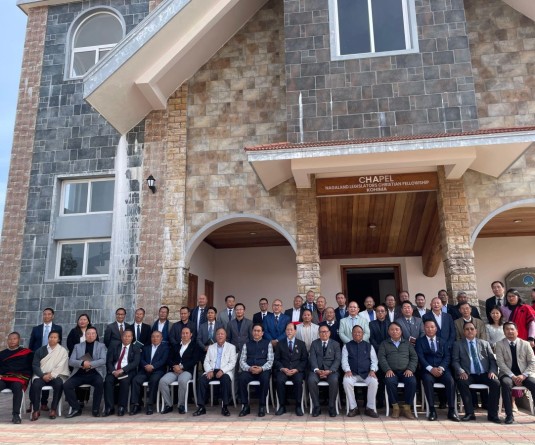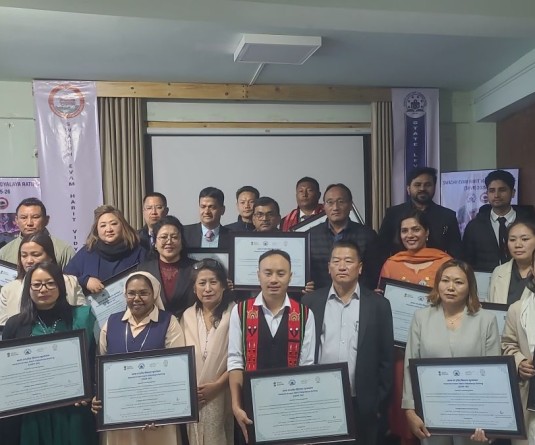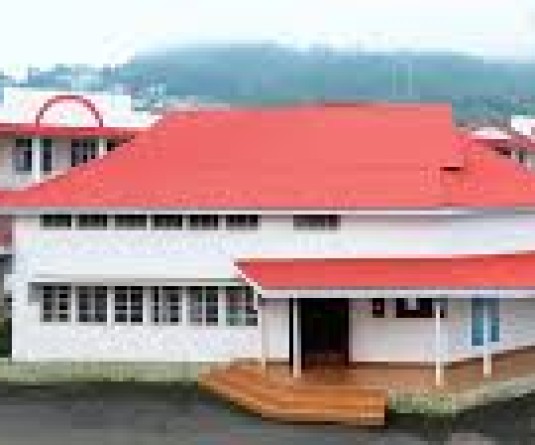
NPMHR 18th Morung Dialogue held
Dimapur, September 21 (MExN): The Naga Peoples Movement for Human Rights (NPMHR), Delhi organised the 18th Morung Dialogue on September 19, on the topic 'To Freedom: A human story', where VS Atem, Gen (Retd), former Longvibu, of the Naga Army and now Member, Collective Leadership, NSCN/GPRN narrated his story of serving in the Naga movement, leading up to his views on the current negotiations.
The chair, Prof Paul Pimomo, Washington University set the tone of the dialogue, posing how life could be post settlement. “Would the settlement answer the dreams of the people? Will the parallel negotiations reconcile into an agreement? Many have passed away without witnessing it.”
According to a press statement issued by the NPMHR, Delhi Gen Atem started by paying tribute and respect to the Nagas- both living and dead - who have sacrificed for the Naga cause. He made special mention of Naga women who have suffered great humiliation and hardships in the hands of the enemy but is hopeful that a solution will emerge as the people have been praying and fasting ceaselessly for God’s intervention.
Born into a Christian family, with both his father and grandfather serving as pastors, gen Atem believes his path in the national movement was prepared by the deeds of his parents and grandparents. Despite many personal hardships and sufferings endured in his journey, he expressed no regrets of his 47 years dedicated to the Naga national movement.
Recollecting the heavy operations by the Indian army conducted in his village during his childhood, Gen Atem narrated a formative memory when as a boy a rifle was pointed at him by an Indian army personnel, who menacingly demanded where the 'Naga hostiles' were located. He said he had never heard the word ‘hostile’ before and so innocently pointed towards the hostel in the village instead as it sounded similar. The army slapped him and for a long time he could not understand why he was slapped.
It was in 1966, that he first experienced the ‘thrill’ of war, and a sense of retribution when, himself as a youth volunteer and alongwith the Naga army, they looted weapons of the Indian Army.
Gen Atem also narrated an incident from his college days in Shillong. The Naga student leaders were put behind bars for protesting against the screening of the movie ‘Yeh Gulistan Hamara’, because of its racist and demeaning portrayal of the Nagas. While the protest started as a peaceful procession, a fight broke out between the Naga students and the police. The police were easily overpowered by the Naga boys, but later the student leaders including him were arrested.
The then education minister of Nagaland had to be sent to Shillong to release the student leaders from jail. The incident was the turning point for Atem. He left everything, and went straight to join the Naga National Movement in May of 1973. He said that he has not looked back since then.
Gen Atem attributed his success in leading the Naga Army to his commanders. Gen Atem said ‘compared to the Indian army, the Naga army was too small and therefore, there was no room for mistakes.’ Covering 40-50 kms on foot in a day was normal and a necessity for survival. “We were committed. We succeeded. The people supported us. They were the backbone and source of information.”
Regarding the current scenario, Gen Atem expressed disappointment with the long-drawn peace process with the Government of India (GOI). He had thought that the peace talks would find resolution within 4 to 5 years. The reason for this delay, he said, was that the GOI under UPA was not for solution and they were just trying to manage the conflict.
According to him, the current NDA government has everything to conclude the long-drawn negotiation, “but after 5 long years since signing of the Framework Agreement (FA), the Nagas have been patiently holding on.” He is not sure on what pretext the GOI might try to prolong the peace talks.
In response to a question, Gen Atem opined that “no one is a fence sitter and no one is a front runner for the Naga cause.” He said, “Whatever can be done at present should be done.” To him, unless the Nagas are united, there cannot be a solution. He stated, “There are no two issues of the Naga cause but only one, and therefore, there can be only one solution.”
Naga elder, Niketu Iralu, who called the dialogue an “honest conversation,” commented that Naga people have become a people and a nation. According to him, we cannot keep ‘blaming each other for not achieving what we have not achieved yet’. He commented that the Nagas believe and try to act on what is right and good, but according to him, the problem with the Nagas is we have all along ‘done things our way and not God's way’. “Therefore, destructiveness and damage have crept into the struggle.”
Niketu suggested that the ‘advanced’ Naga tribes should take the first step and ask the other tribes to identify where they had done wrong to the Naga people and say that they’re sorry. Thereafter, the other tribes can be given the same opportunity. This to him is the way forward to peace.
In agreement to Niketu, Gen Atem said that the Nagas are superficial and are not truthful to ourselves, to each other and to God. “We need to re-evaluate ourselves. We must continue to speak and act on the truth. He requested the people to point out the things which one is not able to see.”
Gen Atem expressed hope that the different Naga political groups will one day unite even though this unity has been elusive so far. The Covenant of Naga Reconciliation signed in June of 2009 stated that the Naga reconciliation will be based on the historical and political rights of the Nagas. The collective leadership, according to him, hopes that the covenant will be respected by all. He also appealed to the civil society organizations to stand united for the Naga causes and also to recognise the need to understand each other. “Nation building is a collective affair and not a one-sided project,” he asserted.
Gen Atem ended the dialogue asking the Nagas to be prepared for the worst. “We cannot be caught unprepared,” he said. “The present generation should not be scared of suffering and hardship and we must accept every challenge that comes our way and be guided by wisdom from God.”
The Morung Dialogue is a talk series organized by NPMHR, Delhi with the objective to strengthen the power of conversation, sharpen and share ideas and views on issues that affect our lives and contribute to democracy, JustPeace and social justice.






